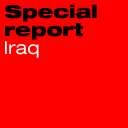 |
|
| |
|
| ||||||||||||||||||||||||||||||||||||||||||||||||||||||||||||||||||||||||||||||||||||||||||||||||||||||||||||||||||||||||||||||||
 |
|
| |
|
| ||||||||||||||||||||||||||||||||||||||||||||||||||||||||||||||||||||||||||||||||||||||||||||||||||||||||||||||||||||||||||||||||

|
US claims on Iraq called into question
Inspectors pick holes in Powell allegations and call for patience in carefully coded message to council Jonathan Steele Saturday February 15, 2003 The Guardian Colin Powell's long dossier of Iraq's alleged non-compliance came under withering attack from the chief UN weapons inspectors yesterday. They said they found several elements of his evidence either false or unconvincing. Hans Blix picked on two satellite images of a chemical warfare site, which the US secretary of state told the security council, in his 90-minute presentation last week, proved Iraq was engaged in deception. Mr Powell had shown two photographs of the site at Al Musayyib, taken in May and July last year. The site was used to trans-ship chemical weapons from production facilities out to the field, he said. On the first occasion there was what Mr Powell described as a "decontamination vehicle associated with biological and chemical weapons activity". Two months later the vehicle had gone and the site had been bulldozed and graded, he said. But Mr Blix made it clear he found the pictures unconvincing. "The reported movement of munitions at the site could just as easily have been a routine activity as a movement of proscribed munitions in anticipation of an imminent inspection," he said. He accepted that governments had many sources of information that were not available to the inspectors, but he added drily: "Inspectors must base their reports only on evidence which they can themselves examine and present publicly. Without evidence, confidence cannot arise." The thinly veiled attack on Mr Powell's case for war by the chief arms inspectors adds to the problems the US and Britain are facing in making their argument on the world stage. Last week a similar British dossier was discredited when it became clear that it had been compiled from old academic papers which it had passed off as partly drawn from "intelligence". Mr Powell last week made much of an engine testing stand for which he also showed the security council satellite pictures. It was "clearly intended for long-range missiles that can fly 1,200 kilometres", he claimed, adding: "These are missiles that Iraq wants in order to project power, to threaten, and to deliver chemical, biological and - if we let him - nuclear warheads." Iraq last week rebutted the US charges, arguing that the testing stand had a longer exhaust facility than earlier ones only because it was set up horizontally rather than vertically. In his report yesterday, Mr Blix came down closer to the Iraqi position. "So far, the test stand has not been associated with proscribed activity," he said. In other words, there was no evidence it had been used in ways deemed illegal under UN resolutions. Mr Blix also cast doubt on Mr Powell's claims that Iraqi officials had been tapping the inspectors' telephones and hastily moving material from sites shortly before the inspectors arrived. "In no case have we seen convincing evidence that the Iraqi side knew in advance that the inspectors were coming," Mr Blix said. Speaking after Mr Blix, Mohamed El Baradei, the chief nuclear inspector and director of the International Atomic Energy Agency (IAEA), also questioned Mr Powell's claims. He referred to documents removed from an Iraqi scientist's home. Mr Powell had said the 2,000 pages had been found thanks to intelligence supplied to the inspectors. Mr
El Baradei said the documents referred to uranium enrichment using
lasers. "Nothing contained in the documents alters the conclusions
previously drawn by the IAEA concerning the extent of Iraq's laser
enrichment programme," he said. Printable version | Send it to a friend | Read it later | See saved stories | |||||||||||
 |
 |